改错题专题讲解与训练
高中病句改错练习题及讲解
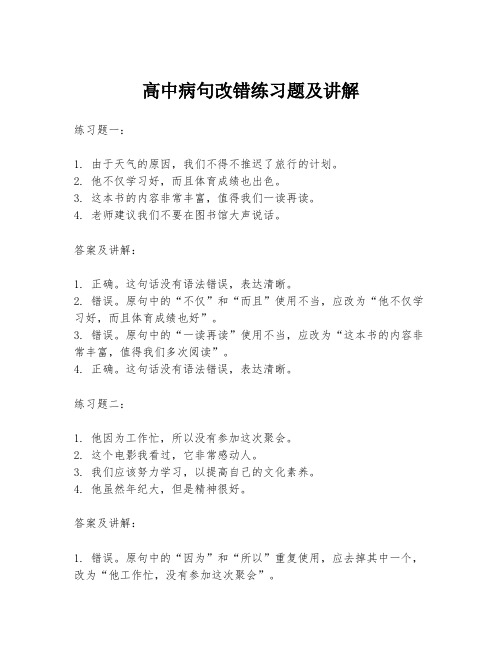
高中病句改错练习题及讲解练习题一:1. 由于天气的原因,我们不得不推迟了旅行的计划。
2. 他不仅学习好,而且体育成绩也出色。
3. 这本书的内容非常丰富,值得我们一读再读。
4. 老师建议我们不要在图书馆大声说话。
答案及讲解:1. 正确。
这句话没有语法错误,表达清晰。
2. 错误。
原句中的“不仅”和“而且”使用不当,应改为“他不仅学习好,而且体育成绩也好”。
3. 错误。
原句中的“一读再读”使用不当,应改为“这本书的内容非常丰富,值得我们多次阅读”。
4. 正确。
这句话没有语法错误,表达清晰。
练习题二:1. 他因为工作忙,所以没有参加这次聚会。
2. 这个电影我看过,它非常感动人。
3. 我们应该努力学习,以提高自己的文化素养。
4. 他虽然年纪大,但是精神很好。
答案及讲解:1. 错误。
原句中的“因为”和“所以”重复使用,应去掉其中一个,改为“他工作忙,没有参加这次聚会”。
2. 错误。
原句中的“非常感动人”使用不当,应改为“这个电影我看过,它非常感人”。
3. 正确。
这句话没有语法错误,表达清晰。
4. 错误。
原句中的“虽然...但是”使用不当,应改为“他虽然年纪大,但精神很好”。
练习题三:1. 经过老师的讲解,我对这个问题有了更深刻的理解。
2. 他不仅会弹钢琴,还会拉小提琴。
3. 我们应该尊重每个人的选择,不应该强迫别人做自己不愿意做的事情。
4. 他虽然学习刻苦,但是成绩并不理想。
答案及讲解:1. 正确。
这句话没有语法错误,表达清晰。
2. 错误。
原句中的“不仅...还会”使用不当,应改为“他不仅会弹钢琴,还会拉小提琴”。
3. 正确。
这句话没有语法错误,表达清晰。
4. 错误。
原句中的“虽然...但是”使用不当,应改为“他虽然学习刻苦,但成绩并不理想”。
练习题四:1. 我们不能因为个人的利益而牺牲集体的利益。
2. 他不仅学习好,而且还会帮助别人。
3. 我们应该珍惜时间,不要浪费时间。
4. 他虽然工作忙,但是仍然坚持学习。
改错专题PPT课件
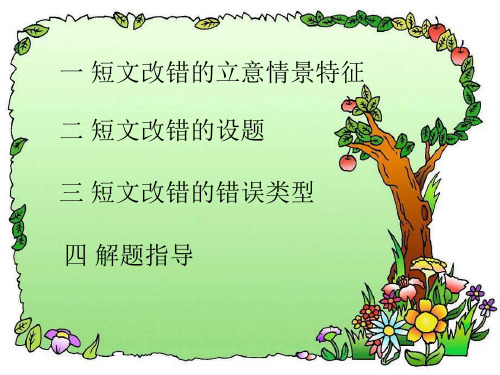
分析:watch改为watching。and 之后为又一句子,动词watch 不能用作主语,名词watching才能用作主语。
3. After an hour or so we began to feel very frightening. (NMET91
2. Can you tell me about what I should do?(NMET2004)
分析:去掉about。 Tell是及物动词.
3.错词 此类错误涉及面较广,较为常见的是搭配错误和语法 错误。考生平时写作中易范的错误常常是命题的焦点。 A. 介词错误 B. 名词单复数误用 C. 代词误用 H. 连词误用 D. 时态错误 E. 非谓语动词错误 I. 冠词误用 F. 主谓不一致错误
分析:stranger 改为 strangers。主语为 we。
C. 代词误用 1.The main problem was that I always thought in Chinese and tried to translate anything into English. (NMET2003) 分析: anything改为everything。依语境知。 2.And I can’t forget the good food you cooked for I. (NMET95) 分析: 第二个 I 改为 me。 D. 时态错误 1.Sometimes, we talked to each other very well in class. (NMET2004) 分析: talked 改为talk 。文章是描述现在发生的事情。 2. Playing football not only makes us grow up tall and strong but also give us a sense of fair play and team spirit. (NMET98) 分析: give 改为 gave。
三年级句子改错练习题及讲解

三年级句子改错练习题及讲解句子改错练习题一:1. Tom is go to school by bus every day.2. There is many books on the shelf.3. My mother likes cook delicious food.4. I have a dog call Lucy.5. We plays football in the park yesterday.句子改错练习题二:1. My sister goed to the supermarket yesterday.2. The cat are sleeping on the sofa.3. I have two pen on my desk.4. They likes to play basketball.5. The sun rises in the west.讲解:在三年级的英语学习中,句子改错是一个非常重要的练习环节。
通过纠正句子中的语法错误,学生可以加深对正确语法结构的认识。
以下是针对上述两个改错练习题的讲解。
句子改错练习题一讲解:1. 错误:Tom is go to school by bus every day.改正:Tom goes to school by bus every day.解析:在一般现在时中,第三人称单数的动词需要加上"-s"。
原句中的"go"应改为"goes"。
2. 错误:There is many books on the shelf.改正:There are many books on the shelf.解析:当主语为复数时,谓语动词需要使用复数形式。
原句中的"is"应改为"are"。
3. 错误:My mother likes cook delicious food.改正:My mother likes to cook delicious food.解析:在表示喜好、爱好等动词后面,需要使用不定式形式。
短文改错答题技巧、解题方法
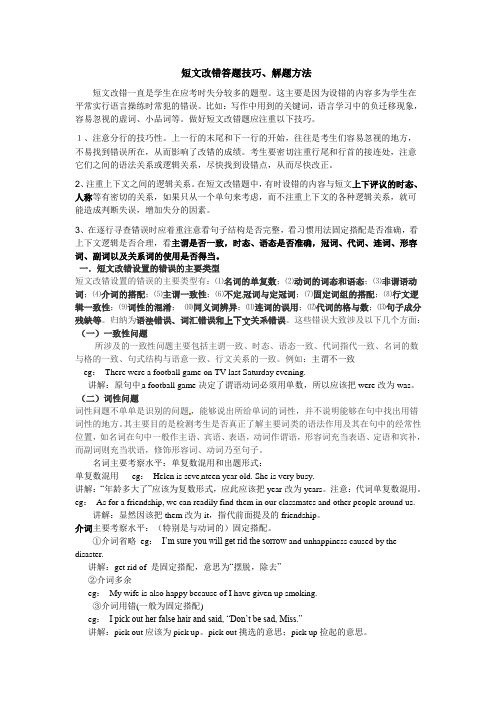
短文改错答题技巧、解题方法短文改错一直是学生在应考时失分较多的题型。
这主要是因为设错的内容多为学生在平常实行语言操练时常犯的错误。
比如:写作中用到的关键词,语言学习中的负迁移现象,容易忽视的虚词、小品词等。
做好短文改错题应注重以下技巧。
1、注意分行的技巧性。
上一行的末尾和下一行的开始,往往是考生们容易忽视的地方,不易找到错误所在,从而影响了改错的成绩。
考生要密切注重行尾和行首的接连处,注意它们之间的语法关系或逻辑关系,尽快找到设错点,从而尽快改正。
2、注重上下文之间的逻辑关系。
在短文改错题中,有时设错的内容与短文上下评议的时态、人称等有密切的关系,如果只从一个单句来考虑,而不注重上下文的各种逻辑关系,就可能造成判断失误,增加失分的因素。
3、在逐行寻查错误时应着重注意看句子结构是否完整,看习惯用法固定搭配是否准确,看上下文逻辑是否合理,看主谓是否一致,时态、语态是否准确,冠词、代词、连词、形容词、副词以及关系词的使用是否得当。
一.短文改错设置的错误的主要类型短文改错设置的错误的主要类型有:⑴名词的单复数;⑵动词的词态和语态;⑶非谓语动词;⑷介词的搭配;⑸主谓一致性;⑹不定冠词与定冠词;⑺固定词组的搭配;⑻行文逻辑一致性;⑼词性的混淆;⑽同义词辨异;⑾连词的误用;⑿代词的格与数;⒀句子成分残缺等。
归纳为语法错误、词汇错误和上下文关系错误。
这些错误大致涉及以下几个方面:(一)一致性问题所涉及的一致性问题主要包括主谓一致、时态、语态一致、代词指代一致、名词的数与格的一致、句式结构与语意一致、行文关系的一致。
例如:主谓不一致eg:There were a football game on TV last Saturday evening.讲解:原句中a football game决定了谓语动词必须用单数,所以应该把were改为was。
(二)词性问题词性问题不单单是识别的问题,能够说出所给单词的词性,并不说明能够在句中找出用错词性的地方。
中考英语改错题专题训练(含解析)

英语改错题1:There is going to have much beef on the plate. have → be2: I don’t think his dress is dearer than Kate. Kate → Kate’s3: I can’t hear you. Could you speak it louder. 去掉it4: It’s kind for you to help me to do the cleaning. for → of5: Mr. Black, a good friend of me, likes drawing horses. me → mine6: Don’t stay at home. You had better to go out for a walk. 去掉to7: We will hold a sports meeting next Monday if it won’t rain.won’t → doesn’t8: The boy called Tom was born in the morning of May 2nd, 1990. in → on9: Jim is much cleverer than any other students in Grade 3, but he doesn’twork hard. students → student10: Look! Two hundreds students are watching a football match on the playground.hundreds → hundred11: Is there new anything in this talk. new anything → anything new12: Neither Ann nor I are a League member. are → am13: Hurry up, and you won’t catch the train. and → or14: This story is not so longer as that one. longer → long15: How long will she be back, in three days or a week. How long → How soon16: Mrs. Smith found that difficult to study English well. that → it17: There is little water in the glass, isn’t there. isn’t → is18:Three fifths of books here is mine. is → are19: Father told me that light travelled faster than sound. travelled → travels 20: Tom said he was feeling even worst. worst → worse21: Ann didn’t know how work out the problem in class. work out→to work out22: How did you do with the bad eggs . How → what23: I’ve forgotten the number , you should look up it again. look up it → look it up. 24: He will have trouble learn English well in a year. learn → learning25: I’ll telephone you as soon as he will come back. will come → comes26: Why not ask for help when you were with trouble. with → in27: Look! What happy the children are in the garden. what → how28: You’d better speak as more English as you can. more → much29: with my help , he finished made the kite at last. made → making30:We have learned English since two years and a half. since →for31: I’ll go back home as soon as school will be over. will → is32: You’d better speak as more English as you can. more → much33:Could you please to clean the classroom ? to clean → clean34: Father tells his son how far is it from the earth to the moon.is it → it is35: Neither he nor I were sending e-mails then. were → was36: A friend of him went to Japan last Sunday. him → his37: Not every child like sandwiches. like → likes38: My mother told me d on’t to watch too much TV. don’t → not39: Don’t forget anything behind when you go back home. forget → leave40: Boys are always exciting about playing football. exciting → excited41: There used to have few tall buildings around our village. have → be42: The whole society speaks high of medical workers. high → highly43: People say that the world’s populations may be seven billion by the year 2010 populations → population44: Nanjing is one of the most beautiful city in China. city → cities45: She has bought this jacket for nearly ten days. bought → had46: Edison’s father asked him why he wanted a science lab for. why → what47: In a few years time, computers will be widely used in China.years → years’48: Here are two books, One is yours and another is John’s.another → the other49: Soon we got used to live in the country with the farmers. live → living50: The population of China is more than that of Canada. more → larger51: The Greens has never been to the Great Wall before. has → have52: He spent an hour do his homework last night. do → doing53: I have too much rules in my class. too much → too many54: I have rice, beef and potatos for lunch. potatos → potatoes55: Sally has no brother and sister. and → or56: I would like eating different vegetables every day. eating →to eat57: How do you think of the movie. How → What58: Vegetables are very good for your healthy. healthy → health59: Which is easy to learn, swimming or skating? easy → easier60: How many bottle of milk are there in the box? bottle → bottles61: Many people had a cold because the bad weather. because → because of62: My dream is travel all over the world. travel → to travel63: Could you please to clean the classroom. to clean → clean64: Tina is a 11-year-old girl. a → an65: Sally sings as good as professional singers. good → well66: The price of the sweater is really expensive. expensive → high67:Taking exercise would help you relaxing. relaxing → relaxed68: The little girl has a beautiful sound. sound → voice69: He was very angry with my words. with → at∕about70: With his surprise, she climbed up the mountain in the end.With → To71: She felt sad when she heard her dog’s dead. dead → death72: She is afraid of speaking in the front of other people. 去掉the73: Though he lives lonely, he doesn’t feel lonely lonely → alone74:Jim works in an university. an → a75: This is Tom’s bike, it isn’t my. my → mine76: Tom is good than me at English. good → better77: Each of us have an English-Chinese dictionary. have → has78: She didn’t tell me where she will go. will → would79: Yesterday I had my computer repair. repair → repaired80: Miss Green has been to Japan and she will be back tomorrow.has been to → has gone to81: If I will be free tomorrow, I will go hiking with my friends.will be → am82: You are not felling good. good → well83: Don’t forget ask your classmates for help. ask → to ask84: I want drink a bottle of orange now. drink → to drink85: The number of students in our class are 36. are → is86: She would like to eat delicious something.delicious something → something delicious87: I am interesting in action movies. interesting → interested88: This book doesn’t belong to Jenny’s. It’s Mary’s Jenny’s → Jenny 89: Uncle John gave us some good advises on how to learn English well.advises → advise90: Bill is doing his homework when I got to his home. is → was91: Many workers were made work all day in the old days. work → to work 92: Alice’s father enjoyed herself in the park last night.herself → himself93: Bob, I don’t know what to deal with it. what → how94: Could you tell me how can I get to the hospital? can I → I can95: There are a pen and two pencils in the pencil-box. are → is96: I’m used to get up early in the morning to catch up the early bus.get → getting97: Chongqing is bigger than any city in China. any → any other98: This question is little more difficult than that one. little → a little 99: Listen carefully! You can hear her sing an English song. sing → singing 100: The foreigner says Beijing Duck taste delicious. taste → tastes 101: It’s true that some ads can be confused. confused → confusing 102: To our surprises, he returned on a cold, snowy night.surprises → surprise103: I was so tired that I could hard walk any more. hard → hardly104: How long does it take you driving to work every day? driving → to drive 105: Could you buy any apples for me .Mum? any → some106: My friend Ann doesn’t write so good as her her sister. good → well 107: When did your father get back to home yesterday? 去掉 to108: I have had a bad cold three days ago. have had → had109: The man lives in Canada and speak English. speak → speaks110: The old woman fell over and hurt her. her → herself111: His words made us relaxing. relaxing → relaxed112: He prefers playing football to swim. swim → swimming113: They were very tired, so they stopped to work. to work → working 114: Don’t forget turning off the light when you leave. turning → to turn 115: The book is wrote by Moyan. wrote → written116: The boy often fulls his bag with books. fulls → fills117: We often watch TV in Saturday evenings. in → on118: I hope you to have a good holiday. hope → wish119: -Must we finish our homework at school?-No, you mustn’tmustn’t → needn’t ∕don’t have to120: There are many apples here. Would you like the other one.the other → another121: Who has the more apples, Jim, Tom or LiLei? more → most122: Is there important anything in today’s newspaper.important anything → anything important123: Smoke is bad for our health. Smoke → Smoking124: The computer spent me 5,000 yuan. spent → cost125: There are many flowers on every side of the road. every → each ∕either 126: Birds flew back because the fine environment. because → because of 127: It rains so hardly. I have to stay at home. hardly → hard∕ heavily 128: I don’t know when should we start. should we → we should129: Mary is going to Japan for two weeks. for → in130: Why don’t you going fishing this Sunday? going → go131: The boy with his mother are going to Beijing tomorrow. are → is132: This story sound very interesting. sound → sounds133: They are going on a study trip to London at next week. 去掉 at134: There are three hundreds and sixty-five days in a year.hundreds → hundred135: How long does it spend to finish reading the book? spend → take136: Thank you very much for help us. help → helping137: China has most people than any other country in the world.most → more138: Which is easy to learn, fishing or swimming? easy → easier139: How many bottle of milk are there on the table? bottle → bottles 140: I need three teaspoons for honey. for → of141: My sister win a prize for her singing. win → won142: The workers were made work more than ten hours every day in old days.work → to work143: Dalian has a history of more than 100-years old. 100-years → 100-year 144: Many people had a cold because the bad weather. because → because of 145: We are going to have fun learn English. learn → learning146: He is the three teachers to give a talk in the morning. three → third 147: How about buy some drinks and snacks. buy → buying148: Sorry, I forgot to buy a bottle of ink to you. to → for149: - Could you please do the dishes?- Sorry, I couldn’t. couldn’t → can’t150: The price of the coat is very expensive. I can’t afford it.expensive → high151: John’s homework is much more than Jim. Jim → Jim’s152: It takes her half an hour clean her room. clean → to clean153: Mr. Zhou was born in June 9, 1949. in → on154: He becomes a movie star when he was three years old.becomes → became155: He is a well-known Brazil soccer player. Brazil → Brazilian156: The pair of trousers are very nice. are → is157: When you finish clean your room, we’ll go to a movie .clean → cleaning 158: The number of giant pandas is getting less and less.less and less → smaller and smaller159: We went to swim in the river in a very hot day. in → on160: I have studied English for three years since I had come here.had come → came161: The train has left for twenty minutes. has left → has been away162: His father has joined the party since 1978.has joined → has been a member of163: I’m earlier today. I came here by his car. by → in164: We are used to do eye exercises every afternoon. do → doing165: I’ll think about become a teacher when I grow up. become → becoming166: My MP4 is broken, I’ll have it repairing tomorrow morning.repairing → repaired167: I saw our math teacher ran on the playground. ran → running168: You needn’t to wear too warm coat. to wear → wear169: I can play the piano well when I was a small boy. can → could170: I will visit her as soon as I will be there next month. will be → am171: Her grandfather has died for the years. has died → has been dead172: Both Susan and Lucy has been to Paris on holiday. has → have173: Either you or he go to the meeting, it doesn’t matter. go → goes174: Not only you but also everyone here like watching football games.like → likes175: Because all the students went to Beijing visit, so we couldn’t find anyone in the classroom. because ∕ so →去掉because∕ so176: Though it rains heavily, but workers still keep working.though ∕ but →去掉though∕ but177:I missed the exciting match because the bad traffic.because → because of178: Do you know the girl on white. on → in179: A lot of French wines are made of grape. of → from180: In the beginning of the book, there are some interesting stories.in → at181: It took them two days to walk across the forest. across → through182: Jane said she would come here from 9:00 and 9:30 tomorrow morning.from → between183: My sister Lucy can skate very good. good → well184: The teacher said that she was very a clever girl. very → quite185: The man is enough tall to touch the kite on the tree.enough tall → tall enough186: He hard writes to his family these years, does he ? hard → hardly187: It’s true that pigs eat many more than rabbits. many → much188: We climb sometimes mountains on weekends.climb sometimes → sometimes climb189:The meat goes bad. It smells terribly. terribly → terrible190: I haven’t turned off my radio already. already → yet191: What else things have you done today? else → other或去掉things 192: I’m not full, I need two another cakes. another → more193: The movie was so sad that it made us to cry. to cry → cry194: He is a famous Brazil football player. Brazil → Brazilian195: Thanks for their help, I found the hospital soon. for → to196: Miss Wang speaks such fast that I can’t follow her. such → so197: She was relaxing about exams. relaxing → relaxed198: I can’t pass all the exams with your help. with → without199: She never borrows her things to others. borrows → lends200: Lily stays at home herself, she feels alone. alone → lonely201: There are some kites are flying in the sky. are flying → flying202: There is a bridge on the river. on → over203: We put of the picnic because of the rain. of → off204: The ticket is on the floor,please pick up it. pick up it → pick it up 205: The boy was very activity in the sports meeting. activity → active 206: Sally is going to marry with James this Sunday. with → to207: Tony said that he forgot his umbrella in the library. forgot → left 208: I hope you can provide me for some information about your school.for → with209: The fish we caught yesterday is still living. living → alive210: Such warm weather in winter in Ha’erbin is quite usual.usual → unusual211: Please write to me as soon as possibly. possibly possible212: He dreams of be a famous computer programmer. be → being213: Miss Smith put the new dress on, and looked at she in the mirror.she → herself214: You must hide medicine away children. away → away from215: My parents have nothing against watch TV. watch → watching216: You look tired, If I am you, I’d have a rest instead of walking to work. am → were217: The 2012 Olympic Games will hold in England. hold → be held218: Playing too much can get in the way to studying. to → of219: We should practice read English every day. read → reading220: Look! The cat is playing with a die mouse. die → dying∕dead221: The price of the sweater is really expensive. expensive → high222: Sally sings as good as professional singers. good → well223: I start to play basketball at the age of three. start → started224: Would you mind sit down and talking with us? sit → sitting225: This room is too small for the family to live. live → live in226: Why not buy a scarf to your mother? to → for227:Maybe some flowers can make your mother happily. happily → happy228: Zunyi is an interesting city has very colorful history. has → with 229: John has studied in this school for one and a half year. year → years230: If you will watch a video at the party, you will have a great time.will watch → watch231: What happens if they have the party. happens → will happen232: A number of students in Zunyi walks to school. walks → walk233: Jack is walking down the street when it rained yesterday. is → was234: He followed the alien and saw where was it going. was it → it was235: I wasn’t surprising to know that they failed again.surprising → surprised236: It was one of the most important event in Chinese history.event → events237: I think kids will study on computers after thirty years. after → in238: Jack is talking with his old friend in the phone. in → on239: I like the same color as lily is. is → does240: I saw the boy is playing soccer on the playground. is playing → playing 241: He is finding his lost book here and there. finding → looking for242: The red bicycle mustn’t be Miss Hu’s ,hers is blue.mustn’t →can’t243: I really need it because of I have a math test. 去掉of244: There must be something to visit the homes in our neighborhood.to visit → visiting .245: I prefer staying at home to play with him outside. play → playing246: The ice is too thin for us to skate. skate → skate on247: The doctor will be free after ten minutes. after → in248: The rest of the money were spent on books. were → was249: This is the only English-Chinese dictionary which I could find in the shop which → that250: More than one student have seen the film . have → has251: Does John know any other language except French?except → besides252: This is the best film which I have ever seen. which → that253: Who is the man who has white hairs? who → that254: I will never forget the days which we had a good time together at the sea. which → when255: I really don’t know how to say at the meeting. how → what256: Eating lots of burnt food is badly for health. badly → bad。
高考英语语法改错题讲解和练习

高考英语语法改错题讲解和练习高考语法改错题综合讲练高考短文改错的短文通常只有110个词左右,文体都为第一/三人称记叙文、应用文(以书信为主)。
所选取的语言材料贴近实际生活,文字浅显易懂,句子结构简单,基本上是简单句和并不复杂的复合句,语言地道,符合英语语言习惯,各种错误所占比例为,1:1:8 (多词:缺词:错词)。
答题原则:1. 规范性原则:要严格按照示范规定的符号改错,要记住表示错词纠正、缺词填补、多词删除的符号,切忌用文字说明或用箭头表示。
2. 四不改原则,(1)单词拼写不改;(2)大小写不改;(3)词序错误不改(应从错词或少词方面考虑);(4)标点符号不改。
四改动原则: (1)忠实于原文原则(不可改变原文的原意);(2)错误以改动最少为原则;(3)虚词以添加或删除原则;(4)实词以改变形式为原则。
考点:短文改错的错误主要是以下两方面:一、语法方面。
主要考查动词时态和语态、非谓语动词、名词和代词的各种形式、主谓一致、冠词、连词、介词、词形(指应该用动词、名词、形容词还是副词形式,以及平行结构中的词的正确形式)4. Maybe you could come during a winter holidays.5. For example, when I was a child, the rain wasa mystery.固定搭配1. Some wanted to see the program while others preferred another.2. I’ll take this chance to wish you wonderful time on your birthday.3. Suddenly, I caught a sight of my English teacher in the crowd.4. We may be one family and live under a same roof.5. My teacher advised me to keep my diary.名词【数】(15全国Ⅰ)The airs we breathe is getting dirtier and dirtier.(15全国Ⅱ)One day, little Tony went to a shopping center with his parent.自练A group of sheeps are eating grass and leaves at the foot of the hill.The book will give you all the informations you need.注意单复数同形: fish, dear, sheep, means, Chinese,Japanese等不可数:furniture, fun, homework, paper, news, progress, trouble, advice, information, work, equipment等In their opinions, they should have more holidays.记清一些用于固定词组中名词的特殊用法,如in one’s opinion, keep one's word, take measures to do sth,take action to do sth备考重点:1.分清可数名词不可数名词;2. 搞清可数名词的复数规则特别牢记不规则可数名词的复数;3. 熟记大纲中固定短语中的名词单复数形式。
高中语法改错练习题及讲解
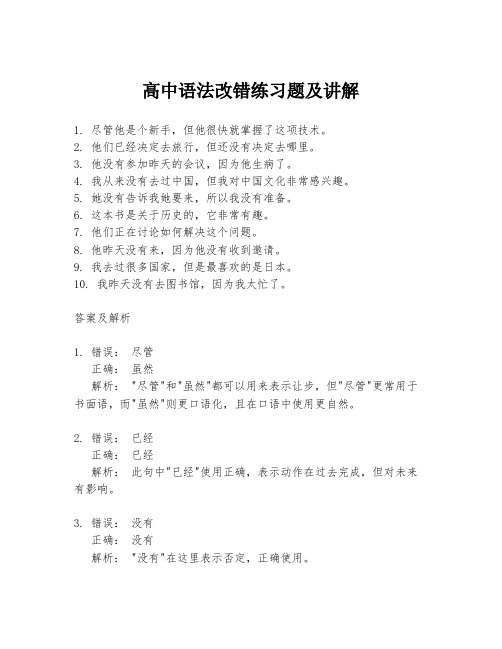
高中语法改错练习题及讲解1. 尽管他是个新手,但他很快就掌握了这项技术。
2. 他们已经决定去旅行,但还没有决定去哪里。
3. 他没有参加昨天的会议,因为他生病了。
4. 我从来没有去过中国,但我对中国文化非常感兴趣。
5. 她没有告诉我她要来,所以我没有准备。
6. 这本书是关于历史的,它非常有趣。
7. 他们正在讨论如何解决这个问题。
8. 他昨天没有来,因为他没有收到邀请。
9. 我去过很多国家,但是最喜欢的是日本。
10. 我昨天没有去图书馆,因为我太忙了。
答案及解析1. 错误:尽管正确:虽然解析: "尽管"和"虽然"都可以用来表示让步,但"尽管"更常用于书面语,而"虽然"则更口语化,且在口语中使用更自然。
2. 错误:已经正确:已经解析:此句中"已经"使用正确,表示动作在过去完成,但对未来有影响。
3. 错误:没有正确:没有解析: "没有"在这里表示否定,正确使用。
4. 错误:我从来没有去过正确:我从未去过解析: "我从来没有去过"和"我从未去过"都可以用来表达过去没有做过某事,但"我从未去过"更为简洁。
5. 错误:没有告诉我正确:没有告诉我解析:此句中"没有告诉我"使用正确,表示过去未被告知。
6. 错误:它非常有趣正确:它非常有趣解析:此句中"它非常有趣"使用正确,表示对书的评价。
7. 错误:正在讨论正确:正在讨论解析: "正在讨论"表示正在进行的动作,使用正确。
8. 错误:没有收到正确:没有收到解析: "没有收到"表示过去未收到,使用正确。
9. 错误:但是正确:但是解析: "但是"在这里表示转折,使用正确。
10. 错误:我昨天没有去正确:我昨天没有去解析: "我昨天没有去"表示过去未去,使用正确。
2024年最新高考英语改错题专题讲解和练习直接高考
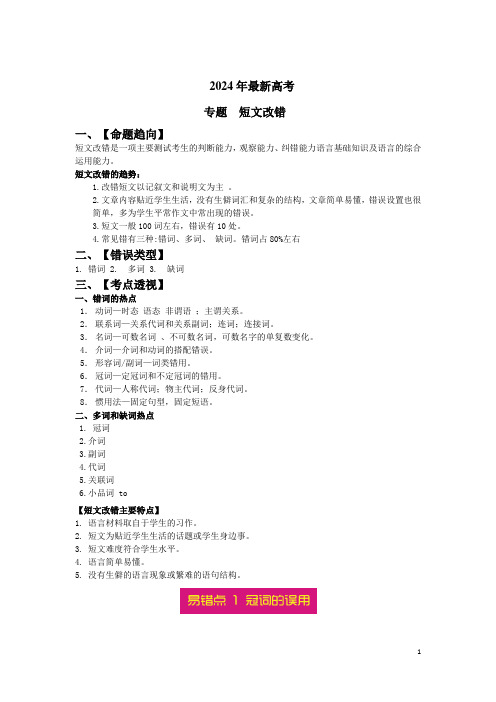
2024年最新高考专题短文改错一、【命题趋向】短文改错是一项主要测试考生的判断能力,观察能力、纠错能力语言基础知识及语言的综合运用能力。
短文改错的趋势:1.改错短文以记叙文和说明文为主。
2.文章内容贴近学生生活,没有生僻词汇和复杂的结构,文章简单易懂,错误设置也很简单,多为学生平常作文中常出现的错误。
3.短文一般100词左右,错误有10处。
4.常见错有三种:错词、多词、缺词。
错词占80%左右二、【错误类型】1. 错词2. 多词3. 缺词三、【考点透视】一、错词的热点1.动词—时态语态非谓语;主谓关系。
2.联系词—关系代词和关系副词;连词;连接词。
3.名词—可数名词、不可数名词,可数名字的单复数变化。
4.介词—介词和动词的搭配错误。
5.形容词/副词—词类错用。
6.冠词—定冠词和不定冠词的错用。
7.代词—人称代词;物主代词;反身代词。
8.惯用法—固定句型,固定短语。
二、多词和缺词热点1. 冠词2.介词3.副词4.代词5.关联词6.小品词 to【短文改错主要特点】1. 语言材料取自于学生的习作。
2. 短文为贴近学生生活的话题或学生身边事。
3. 短文难度符合学生水平。
4. 语言简单易懂。
5. 没有生僻的语言现象或繁难的语句结构。
1. It was really a nice experience. If you’d like to make trip to our city some day...【错因分析】有些考生认为,experience可以作不可数名词,前面不用不定冠词,于是误将a nice experience中的不定冠词a去掉。
【试题解析】experience前面有形容词nice修饰,故不能去掉a,而make a trip to...是英语中的固定搭配,意为"去某地旅行"。
【参考答案】在trip前加a。
2. His boss wanted to fire him if he didn’t start coming on time, so he went to the doctor for a help.The doctor gave him some...【错因分析】容易将第一个the改为a。
- 1、下载文档前请自行甄别文档内容的完整性,平台不提供额外的编辑、内容补充、找答案等附加服务。
- 2、"仅部分预览"的文档,不可在线预览部分如存在完整性等问题,可反馈申请退款(可完整预览的文档不适用该条件!)。
- 3、如文档侵犯您的权益,请联系客服反馈,我们会尽快为您处理(人工客服工作时间:9:00-18:30)。
专题专练高中英语改错题专题一名词与冠词名词:单复数是否符合句意;有无可数名词与不可数名词之间的误用;有无名词所有格的误用。
冠词:有无两个不定冠词之间的误用;有无定冠词与不定冠词之间的误用;有无冠词的漏用与多用;有无冠词在固定结构中的错用等。
1. I haven’t lived here long, but I have a great many friend here.2. Two German are going to give us a speech on the history of literature.3. A house built of bricks lasts longer than the one that is made of woods.4. We have made more progresses in English study than last term.5. — What can I do for you?— Two tea, please.6. Yesterday afternoon he told me about his experience as a young man.7. The Smith think it all right to buy their daughter the MP4 as a birthday gift.8. This term physics are taught by Mr. Zhang in our school. Failure success9. It is great pleasure to talk with you about the maths problem.10. He has finished a day work in six hours.11. My friend Mary comes from an European country.12. Helen has tried twice in the experiment and she is asked to have the third try.13. All of the sudden the crazy grabbed me around the neck.14. I keep a dog; a dog is called Jack.15. The boy of no more than four years old can play piano very beautifully.16. We rented the house by month when we worked at that factory.17. Of all the boys, Alan is best student who speaks Spanish.18. The young should respect old.19. The accident took place in winter of the year 2010.20. He was made the monitor of our class.21. We all know the man is the most developed animal in the world.22. When we went away, we took each other’s notebook by the mistake.23. This Sunday I will only stay at home and have rest.24. He was born in a small village by sea.代词人称代词单复数指代一致1.The Smiths have been married but we have no children.2.There are forty people in the factory, and thirty of her are women.3.Learning as many English words as possible by heart is indeednecessary for we all to learn English.4.We can see that the tree has shaken off it’s leaves.5.That village appears similar to me, but I am not familiar with it at all.6.The day before the Speech Contest English teacher talked to me.7.You first of all should respect or no one would respect you.8.We should remember we can also know the society by serving ityourself.9.I was learning to express me in simple English.10.The mother hopes that the children will behave by themselves.不定代词1.This book is a good seller, so you can buy one at either shop inBeijing.2.David once lived in London and Manchester, but he likes none.3.On the Internet, we can learn news both at home and abroad and allkinds of another information.4.I will have anything about my future to say.5.The days in summer are longer than in winter.6.I love reading poems by Emerson better than that by Whitman.定语从句中的关系代词1.That is all what Dr. Smith said at he meeting.2.This is the first novel which he has written in English.3.Let children read such books which will make them wiser.专题(三) 介词重点1 具体语境中介词用法辨析1.Every day I have to stay school for over nine hours to have lessons.2.The work will be finished after two hours.3.In Sunday mornings he would sit in the garden, enjoying the warmsun.4.After that they built a bridge through the river.5.I saw the good news about the footmall match on the newspaper thismorning.6.The professor will make the report about the situation in the MiddleEast on Saturday.7.Most of the large cities in the world have grown without plans,between which London is one.8.Except milk and cheese, we also need vegetables.9.Chop the watermelon by a sharp knife.10.W ater can be turned in ice if it is made cold enough.11.A t the end we solved the problem, which made every one very happy.12.O n the corner of the room stood a big old chair.13.M y uncle, along with my brother, will go abroad in business nextweek.重点2 介词的遗漏或冗余1. The book is considered to be great value to you in your studies.2.Because of air pollution being greatly reduced, this city is still a goodone to live.3.Here are five pairs of shoes for me to choose. I don’t know which tobuy.4.They did not seem to have much time to talk about together.5.If you fail the exam you will only be to blame for.6.The teacher told us that we were running out our time.7.Several of the members have come up suggestions of their own.8.He is always playing a joke to his deskmate.重点四形容词与介词的搭配1.Do you have any difficulty on listening.2.She was particular to what she wore when she was still a little girl.3.He was eager with work, for he could not imagine the life without it. 重点五介词与名词的搭配1.I forgot to write the plan by chance, while they didn’t do it by purpose.2.The accident was my fault, so I had to pay for the damage on the othercar.重点六连词与介词的搭配1.He failed again in the exam because his carelessness.2.Take your umbrella in case of it is going to rain.专题四连词重点1 过渡词1.Students who work part-time earn extra money; however, they earn alot about the society they live in.2.Beside, we have to consider their health condition.3.It’s hard work. I enjoy it, but.重点2 并列连词1.Men and women, old or young, all joined in the party.2.You are right, because we should support you.重点3 从属连词1.—Don’t look down upon Tom. He has his own advantages.—Oh, yes. When others are weak, he is strong,重点四连词的混用1.She had golden hair when she was a child, but while she got olderand older, her hair went darker and darker.2.Suppo sed that he doesn’t go to the West, who else can do?专题五形容词与副词及其比较等级重点1 形容词与副词的词性误用1.It was real very dangerous and you might have injured yourself.2.I thought my final attempt to fix it was successfully, but eventually Ifailed.3.He was sitting in a corner, silently.重点2 形容词之间的误用和副词之间的误用1.Some TV programmes can offer us a good chance to attend the livelytalk show.2.Most Americans feel uncomfortable if they stand too closely toothers when talking.3.I had to thing long and hardly before I could find the answer.4.This is quite far the mostly expensive bicycle in the shop.重点3 形容词与副词的比较级的构成错误。
